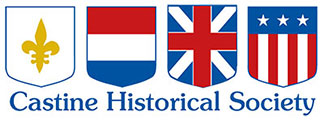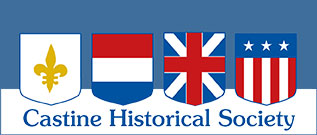Deborah Pulliam Memorial Lecture
For information on our 2024 lecture featuring Hans D. Strauch
click HERE.
 The Deborah Pulliam Memorial Lecture, offered by the Castine Historical Society each year, is named after benefactor Deborah S. Pulliam. Pulliam, who died in 2007, was a generous supporter of organizations both in Castine and beyond. She was an active member of the Castine Historical Society, and she served as the editor of The Castine Visitor for six years. Her bequests to the Castine Historical Society, the Witherle Library, and the Unitarian Universalist Congregation in Castine, as well as her support of the Maine Community Foundation, have enabled numerous community organizations to survive and thrive.
The Deborah Pulliam Memorial Lecture, offered by the Castine Historical Society each year, is named after benefactor Deborah S. Pulliam. Pulliam, who died in 2007, was a generous supporter of organizations both in Castine and beyond. She was an active member of the Castine Historical Society, and she served as the editor of The Castine Visitor for six years. Her bequests to the Castine Historical Society, the Witherle Library, and the Unitarian Universalist Congregation in Castine, as well as her support of the Maine Community Foundation, have enabled numerous community organizations to survive and thrive.
While much has been written about her passion and love for those causes close to her heart, the excerpt below from the Maine Community Foundation website might best describe her generosity and approach to giving.
Deborah Pulliam once told a friend that she had read an article in the Bangor Daily News about an anonymous philanthropic gift that so inspired her that she, too, wanted to give to the cause. Then she realized, with some embarrassment, that she already had given. She was the inspiring donor. That story is as telling about Pulliam as any could be. She gave generously, passionately, anonymously, and without attachment. The results inspired her, and that was what mattered.
The daughter of Jane Bleecker and Eugene S. Pulliam, the former publisher of The Indianapolis Star and The Indianapolis News, Pulliam was raised in a powerful and comfortably affluent family. A writer herself, she was interested in carrying on the family trade, but in a more natural and simple setting. Twenty years ago, she came to Maine to work at the Castine Patriot. Then her father died, and four years later, she and her mother inherited a fortune. Literally.
Yet even friends close enough to share holidays with Pulliam did not know this. To them, she was a rather quiet woman who loved animals, cared deeply about textiles and history, and so loved cookies that she published two cookie recipe books and delighted in hosting cookie exchange parties before the holidays. To this day, many of her friends have no idea that she was at all philanthropic, just as many did not know that the breast cancer she thought she had licked had returned—until it was almost too late to say goodbye. Pulliam died May 22, 2007. She was 54. (Her obituary, as seen in the Bangor Daily News, can be viewed HERE.)
Stubborn, fun, smart, funny, opinionated and straightforward, Pulliam was fierce about not wanting people to treat her differently because she had money. When she heard about her estate, she contacted the Maine Community Foundation so she could give the bulk of her money away–on one condition. She demanded absolute anonymity.
“Pulliam simply felt that she had been given more than one person needs or should have; she wanted to see what that money could do,” says Ellen Pope, then the community foundation’s vice president of philanthropic services. Not surprisingly, Deborah–and numerous organizations across the state, especially downeast–discovered that, yes, much could be accomplished.
Many of the grants from Pulliam’s Belvedere Fund, the foundation’s largest, are directed toward historic preservation, including the $1 million anonymous challenge grant to the Bangor Museum and History Center to energize their $3 million campaign (it was probably this gift that Pulliam read about in the Bangor Daily News). She also gave generously to the Maine Historical Society, as well as to the Maine State Museum, Ruggles House, Waterville Opera House and the Tides Institute and Museum of Art.
Pulliam’s grants to land conservation grants have amounted to more than a million dollars and range from the Penobscot River Restoration Trust to Katahdin Lake to the Sabbathday Lake Shaker Village to the Fund for Maine Land Conservation.
Pulliam was also a strong supporter of animal welfare groups, ranging from the Hancock County Society for the Prevention of Cruelty to Animals to the global Jane Goodall Institute. Additionally, her passion for traditional crafts led her to support organizations such as Maine FiberArts, Maine Indian Basketmakers Alliance and Haystack Mountain School of Crafts.
But that isn’t all, says Pope. Pulliam cared deeply about people and social justice. She gave to food pantries, homeless programs, and to organizations in the wake of the Asian tsunami and Hurricane Katrina, as well as to healthcare, especially community healthcare, including Castine Community Hospital. She might read about a homeless shelter in Bangor and call up the foundation to direct a grant to that group. “She had a real interest in downeast Maine and a real soft heart,” says Pope.
Giving without recognition, adds Pope, is considered the highest form of giving. To Deborah Pulliam, it seems to have been a matter of course.

